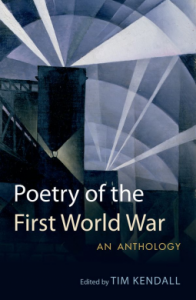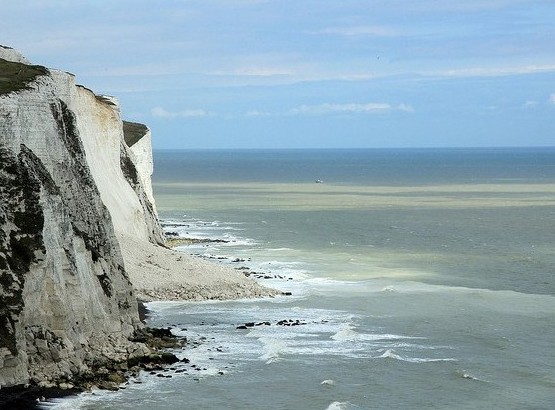The 100th anniversary of the beginning of World War I is officially July 28, the day Austria-Hungary declared war on Serbia and attacked, in retribution for the assassination of the Archduke Ferdinand and Archduchess Sophie in Sarajevo by a Serbian teenager. By the time the war ended, more than 70 million military personnel had been involved; more than nine million combatants were dead; and the German, Austrian, Ottoman, and Russian ruling families were swept from power.
It seems odd to associate poetry with war, but no war is more connected to poetry than World War I. And for that we mostly have the English to thank.
From 1914 to 1918, poetry went to war. But it went to war in all its possible permutations—jingoistic nationalism; nostalgia for a world being fought for even as it passed away; the cynical response of the men in the trenches to their incompetent generals; the mourning of civilians; pacifism and opposition to the war; and the reflection of what it all meant, or didn’t mean, years after the war was over.

Novelist Thomas Hardy, for example, wrote poems about the war, from the outbreak of hostilities in August 1914 to the armistice in November 1918. So did Rudyard Kipling, who lost his son John at age 18 in the Battle of Loos.
And it wasn’t only poets who went to war; men in the trenches read poetry. In fact, Kendall says, the most commonly read book by soldiers in the trenches was A.E. Housman’s A Shropshire Lad, possibly because of the feelings the long poem evoked about the England being fought for.
And after the war, it was largely the poets who framed Britain’s understanding of what had happened and why.
The anthology includes some wonderful poetry, and it’s difficult to limit a choice of favorites to one or two or a handful. Here is one by Rosenberg, who grew up in Whitechapel in London’s East End and was torn between being a painter or a poet until the war arrived:
Break of Day in the Trenches
The darkness crumbles away.
It is the same old druid Time as ever,
Only a live thing leaps my hand,
A queer sardonic rat,
As I pull the parapet’s poppy
To stick behind my ear.
Droll rat, they would shoot you if they knew
Your cosmopolitan sympathies.
Now you have touched this English hand
You will do the same to a German
Soon, no doubt, if it be your pleasure
To cross the sleeping green between.
It seems you inwardly grin as you pass
Strong eyes, fine limbs, haughty athletes,
Less chanced than you for life,
Bonds to the whims of murder,
Sprawled in the bowels of the earth,
The torn fields of France.
What do you see in our eyes
At the shrieking iron and flame
Hurled through still heavens?
What quaver—what heart aghast?
Poppies whose roots are in man’s veins
Drop, and are ever dropping;
But mine in my ear is safe—
Just a little white with the dust.
And there’s Edward Thomas (1878-1917), considered something of a hack writer, Kendall says, until he developed a friendship with and received encouragement from Robert Frost. His first book of poetry was being prepared for publication when Thomas was killed at the Battle of Arras. This is his poem “The Private”:
This ploughman dead in battle slept out of doors
Many a frozen night, and merrily
Answered staid drinkers, good bedmen, and all bores:
“At Mrs Greenland’s Hawthorn Bush, ” said he,
“I slept.” None knew which bush. Above the town,
Beyond `The Drover’, a hundred spot the down
In Wiltshire. And where now at last he sleeps
More sound in France – that, too, he secret keeps.
Two other favorites are Robert Service’s “Only a Boche” and Owen’s “Anthem for Doomed Youth.”

When I finished this deeply satisfying anthology, having read and reread many of the poems, I better understood why this war was so infused with poetry. These poems came from the mud, the blood, the lice, and the tedium of war in the trenches, a tedium interrupted by occasional shellings and horrific battles. And these poems came from the witnessing of friends and comrades dying, often painfully so, and even understanding that the deaths of enemy soldiers was in a way the death of themselves.
This war changed everything, sweeping away what once was and what never could be restored. And poets were there to express it and record it.
Dulce et Decorum Est
Bent double, like old beggars under sacks,
Knock-kneed, coughing like hags, we cursed through sludge,
Till on the haunting flares we turned our backs,
And towards our distant rest began to trudge.
Men marched asleep. Many had lost their boots,
But limped on, blood-shod. All went lame; all blind;
Drunk with fatigue; deaf even to the hoots
Of gas-shells dropping softly behind.
Gas! GAS! Quick, boys!—An ecstasy of fumbling
Fitting the clumsy helmets just in time,
But someone still was yelling out and stumbling
And flound’ring like a man in fire or lime.—
Dim through the misty panes and thick green light,
As under a green sea, I saw him drowning.
In all my dreams before my helpless sight,
He plunges at me, guttering, choking, drowning.
If in some smothering dreams, you too could pace
Behind the wagon that we flung him in,
And watch the white eyes writhing in his face,
His hanging face, like a devil’s sick of sin;
If you could hear, at every jolt, the blood
Come gargling from the froth-corrupted lungs,
Obscene as cancer, bitter as the cud
Of vile, incurable sores on innocent tongues, —
My friend, you would not tell with such high zest
To children ardent for some desperate glory,
The old Lie: Dulce et decorum est
Pro patria mori.
—Wilfred Owen
Featured photo by Karen Roe, Creative Commons, via Flickr. Post by Glynn Young, author of the novels Dancing Priest and A Light Shining, and Poetry at Work
Want to brighten your morning coffee?
Subscribe to Every Day Poems and find some beauty in your inbox.
- Poet Sidney Lanier and the Lost Cause - October 2, 2025
- Poets and Poems: A.J. Thibault and “We Lack a Word” - September 30, 2025
- Poets and Poems: Catherine Strisik and “Goat, Goddess, Moon” - September 25, 2025


Maureen Doallas says
And, if I may, because I think it’s important not to overlook them, women, too, wrote about the war. It’s just one link to some of that work.
http://www.oucs.ox.ac.uk/ww1lit/education/tutorials/intro/women
SimplyDarlene says
Thanks for the link, Maureen. I was wondering about this too.
SimplyDarlene says
The Pluck. wow.
Glynn says
I should have noted that Kendall’s anthology does indeed include poetry written during the war by women, including a poem written in fury at being denied a return to Belgium to work in a field hospital.
SimplyDarlene says
Interesting. Thanks, Glynn.
Peter Kerr says
Are any Scottish poets, especially those writing in Gàidhlig, included?
Sherry Early says
I’ve always been somewhat fascinated by the poetry of World War I, and by the war itself and its effect on the spiritual and moral outlook of the participants. I wonder if a tragedy like WWI would change me and my worldview radically and how it would do so?